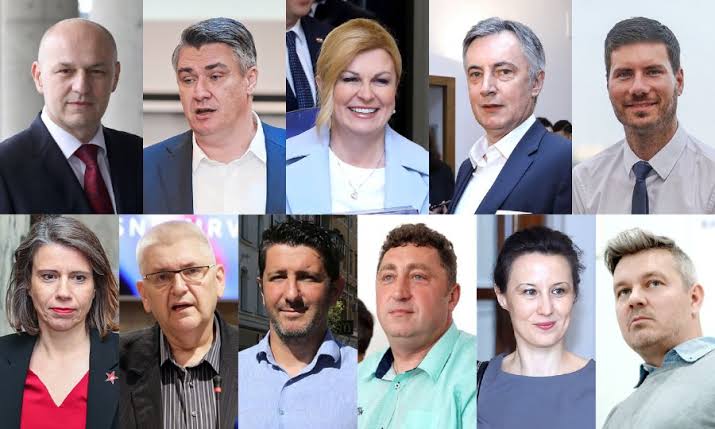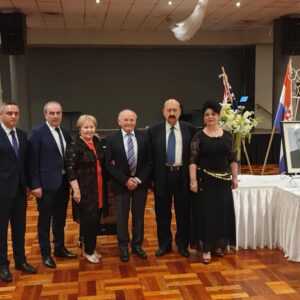The imminent Presidential elections in Croatia set for 22 December 2019 are shaping up as a three-horse race, possibly a four-horse race, despite there being 11 candidates who qualified for the running. According to polls three frontrunners are Kolinda Grabar-Kitarovic (the current incumbent backed by the struggling in popularity stakes ruling political party HDZ/Croatian Democratic Union whose popularity has plummeted with apocalyptic speed in the past couple of years), Miroslav Skoro (a well-known figure in Croatia as long-standing popular musician, former member of Croatian Democratic Union with a seat in 2008 Croatian Parliament, businessman with a Doctorate in Economics who is running as an independent candidate with an expressed intention to topple the current HDZ-led government after he wins office, asking the party’s many members to defect and vote for him) and Zoran Milanovic (former Prime Minister, Social Democrat, with an atrocious record in leading the government of the country, which led to his demise as the leader of his own party in late 2016). The fourth candidate that keeps popping up as having a fairly good chance of winning is Mislav Kolakusic (a lawyer and former court judge who has become known as a politician with his platform to rid Croatia of corruption even though he provides no real or detailed solutions as to how he would free Croatia from that heavy plague).
All in all, all candidates promise big things of changes coming if they win, however, one needs to take a step back in order to see that some changes being promised are not possible under the current powers of the President of the country! But they are all trying to compete who is a bigger and better Tudjmanist!
Miroslav Skoro is the only candidate seeking to increase the president’s powers because he also thinks that the president with current constitutional powers cannot bring change to a society that is seeking change. Presidential powers that Tudjman had were cut and made almost impotent when it comes to leading the nation to the needed transformation from communism into democracy. The president of the republic is elected directly by popular vote for a period of five years and is limited to two terms.
The 1990 constitution originally granted the president very broad powers; the president could dismiss the prime minister, who was nominally responsible to both the parliament and the president but was actually directly dependent on the president. Constitutional amendments in 2000, under the leadership of former communists Stjepan Mesic (then president) and Ivica Racan (the prime minister) reduced the importance of the president of the country, who thenceforth served solely as head of state, and increased the power of the parliament and of the prime minister, who assumed the role of head of government. The president continues to nominate the prime minister, but the parliament must confirm the appointment. With a majority in today’s parliament being former communists, still refusing to denounce the criminal former communist regime, one needs to wonder whether Skoro’s plans to bring about such significant change will end up nothing more than electoral rhetoric. Certainly, it’s difficult to see at this stage that he has the necessary political and practical knowhow support to be able to achieve the turnaround. While Skoro enjoys support of a number of sovereignist political parties and individual politicians of note, the seeking of voter defection should have been directed at all the culprits (both HDZ and SDP) for the critical economic and democratic state Croatia is currently in. Any other approach, singling out one and not the other, would seem to validate an idea that double standards in national politics are acceptable; and they are not. Both HDZ and SDP are almost equally responsible for the current state that cries for change so that mass emigration of valuable workforce, prevalence of corruption and nepotism in public administration and public companies could be stopped or slowed down.
In other words, nothing short of lustration and decommunisation will do! To achieve this voter defection from HDZ and SDP is needed in great numbers.
On Sunday 8 December, at his campaign launch in the large concert hall Lisinski in Zagreb, Miroslav Skoro, whose election slogan is “Now or Never”, declared that he would be the next president of Croatia, and would resume and inherit Franjo Tudjman’s policy, claiming that “today’s HDZ has nothing to do with the HDZ from the time of that first Croatian president”.
That claim angered the incumbent President of HDZ, current Prime Minister, Andrej Plenkovic, and other relatively highly positioned HDZ members, who claim they are the only heirs to Tudjman. “Today’s HDZ is firmly on the path outlined by Tudjman,” President Grabar-Kitarovic said, also, on Tuesday 11 December while visiting Veliko Trgovisce, Tudjman’s birthplace.
Franjo Tudjman led Croatia into independence and that task was a national effort that took enormous sacrifice, dedication and collaboration with Tudjman’s leadership in creating an independent state from multitudes – individuals who were and those who were not members of Tudjman’s HDZ political party as well as other political parties. Hence, it is nothing short of stupidity, disrespect, repulsion and arrogance for Kolinda Grabar Kitarovic and HDZ to claim that “HDZ is the only heir to Tudjman”! The fact is that the entire independence fighting movement and its strong participators are the only heirs to Tudjman and that movement was widespread during the Homeland War of the 1990’s and continues to be widespread today. It was not only members of HDZ that fought for an independent Croatia but, indeed, many others outside HDZ “walls”.
The Social Democratic candidate, former prime minister Zoran Milanovic, has also showed respect and consideration for Tudjman in his campaign. “He was ready to spend time in prison for Croatia… He was not often right, but, in important things at the time, he was right – and many Croatian citizens recognised that,” Milanovic told N1 television on Tuesday 10 December.
This competition as to which one is a better Tudjmanist while in many respects may not be taken seriously by various groups and individuals, may indeed be seen by many others as a strong turning point when the period of de-Tudjmanisation of Croatia (commenced a couple of decades ago under the ormer communists’ pursuits to falsely criminalise Croatian Homeland War and, hence, the legitimacy of its independence struggle) is experiencing an end. And real values, those of full democracy and freedom, are elevated to the point of real progress.
Psychology of voters is basically aligned with psychology of individual and personal choices either on basis of political ideology or personal welfare interests or both. To get enough voters to defect their usual voting preferences is an exercise that is deep, personal and must provide visible benefits for all who may decide to defect from being loyal to one political party for decades. Indeed, if the major changes needed for Croatia are to be successful then defection is needed not only from HDZ echelons but also from SDP (Social Democrats) ones.
Winning someone’s vote in modern democratic societies requires a kind of cluster-bomb approach on the part of political parties. With communication these days (and mainstream media being controlled by major parties) being such a multi-faceted thing, and the opinion polls so either tight or non-dependable, every method — from leaflet dropping, social media to the old-fashioned landline phone — must be harnessed by any candidate serious about breaking the stale mould of voter behaviour that has seen Croatia floating in perpetual bickering and recriminations. The message for the need for change has been put out there but skills for managing that change require much more than any of the candidates have left the impression of possessing or being able to organise. And voters need both the message and the how, otherwise voter behaviour is unlikely to change to an impactful degree for the nation. If anything, these presidential election campaigns have made it clear that Croatia desperately needs changes – changes away from old communist mindset and that is in my view a great thing. The voters should, therefore, give their vote to the one who has the biggest determination for changes and, hence, the biggest likelihood in at least commencing with the changes if not achieving them during the next presidential mandate.




